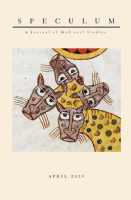
SPECULUM-A JOURNAL OF MEDIEVAL STUDIES
metrics 2024
Enriching Knowledge of the Medieval World
Introduction
SPECULUM: A Journal of Medieval Studies, published by University of Chicago Press, stands as a premier academic platform within the field of medieval studies. With an impressive legacy dating back to its inception in 1926, this journal has attracted scholarly contributions that explore the rich tapestry of human experience during the medieval period, encompassing areas such as history, literature, philosophy, cultural studies, and the visual and performing arts. It boasts elite rankings—Q1 in History, Literature and Literary Theory, Religious Studies, and Visual Arts and Performing Arts, with a commendable Q2 in Cultural Studies and Philosophy—attesting to its impact and relevance in academia. Although it is not an open-access journal, the rigorous peer-review process and critical scholarship found within its pages provide invaluable insights for researchers, professionals, and students alike. With a substantial Scopus ranking, ID 0038-7134, and E-ISSN 2040-8072, SPECULUM continues to serve as an essential resource for advancing knowledge and understanding of the medieval world, encouraging interdisciplinary dialogue and scholarly interaction.
Metrics 2024
 0.20
0.20 1.20
1.20 1.00
1.00 28
28Metrics History
Rank 2024
Scopus
JCI (Web Of Science)
Quartile History
Similar Journals
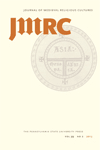
Journal of Medieval Religious Cultures
Charting New Territories: Understanding the Sacred in Medieval SocietyJournal of Medieval Religious Cultures, published by Penn State University Press, stands as a vital resource for scholars in the fields of History and Religious Studies. With its ISSN 1947-6566 and E-ISSN 2153-9650, this journal provides a platform for high-quality research focused on the intersections of religion, culture, and society during the medieval period. Its current impact factor underscores its relevance and citation frequency in academic circles, solidifying its position in the Q3 quartile for both categories as of 2023. The journal's commitment to fostering scholarly dialogue makes it an essential read for researchers, professionals, and students alike, exploring topics that shape our understanding of medieval religious practices and beliefs. Although it does not offer open access, the journal ensures that its contributions are accessible through various academic libraries, facilitating valuable insights into a pivotal era of history. Explore the latest findings and engage with leading scholarship published from 2014 to 2024 at Penn State University Press.

Magnificat Cultura i Literatura Medievals
Fostering Inclusive Research in Medieval HeritageMagnificat Cultura i Literatura Medievals, published by UNIV VALENCIA, SERVICIO PUBLICACIONS, is an esteemed academic journal that has been at the forefront of medieval studies since its inception in 2014. With its Open Access model, this journal ensures that cutting-edge research is readily available to scholars and enthusiasts alike, fostering an inclusive academic environment. Based in Spain, it boasts impressive rankings with a Q2 designation in History and a Q1 in Literature and Literary Theory for 2023, indicating its significant contribution to these fields. The journal is indexed by Scopus, achieving top-tier rankings in both Literature and History, and is recognized in the 87th and 72nd percentiles of their respective categories. With a focus on the complexities of medieval culture and literature, Magnificat serves as a vital resource for researchers, professionals, and students dedicated to exploring the rich tapestry of medieval scholarship.
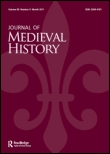
JOURNAL OF MEDIEVAL HISTORY
Delving Deep into the Fabric of Medieval SocietyJOURNAL OF MEDIEVAL HISTORY, published by Routledge Journals, Taylor & Francis Ltd, stands as a vital resource in the field of historical studies, focusing on the complex tapestry of the medieval period from 1975 to 2024. With an ISSN of 0304-4181 and E-ISSN of 1873-1279, this journal boasts an impressive Q2 categorization in History, ranking #502 out of 1760 in the Scopus Arts and Humanities rankings, placing it in the top 29% of its field. The journal aims to publish high-quality, innovative research that enhances the understanding of medieval history, making it an indispensable read for scholars, practitioners, and students alike. While it does not currently offer Open Access options, its reputable standing ensures that it reaches a wide audience dedicated to exploring the intricacies of the medieval era. Engage with cutting-edge scholarship and historical insights that collectively contribute to the advancement of medieval studies.
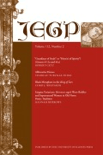
JOURNAL OF ENGLISH AND GERMANIC PHILOLOGY
Innovative Insights into Language and Literary FrameworksJournal of English and Germanic Philology, published by University of Illinois Press, stands as a prestigious forum for scholarly discourse in the fields of linguistics and literary studies. With its ISSN 0363-6941 and an impressive impact factor aligning it within the Q1 and Q2 quartiles in key academic categories, this journal delves into nuanced explorations of both the English and Germanic languages, enriching the understanding of language and its literary frameworks. The journal aims to foster interdisciplinary dialogue, offering cutting-edge research that appeals not only to linguists and literary theorists but also to educators and cultural historians alike. Although the journal is not open access, its contributions are essential for anyone keen on enhancing their knowledge of linguistic phenomena and literary narratives from these influential linguistic traditions. With a commitment to publishing innovative and rigorous scholarship, the Journal of English and Germanic Philology is a vital resource for academics seeking to advance their work in language and literature.

Imago Temporis-Medium Aevum
Connecting Past and Present in Medieval ResearchImago Temporis-Medium Aevum is a distinguished journal published by SPACE POWER & CULTURE- CONSOLIDATED MEDIEVAL STUDIES RESEARCH GROUP, focusing on the rich tapestry of medieval studies within the context of history. Based in the culturally vibrant region of Catalonia, Spain, this journal has established itself as a vital resource for scholars and enthusiasts alike since it adopted an Open Access model in 2007, ensuring that its compelling research is widely accessible. With an impact factor reflected in its Q3 category ranking in the field of History for 2023, and an impressive Scopus rank in the 62nd percentile amongst 1,760 publications, Imago Temporis continues to serve as an incubator for innovative scholarship. The journal's consistent publication history, particularly from 2011 to 2013, 2016 to 2018, and its ongoing commitment through 2024, underscores its dedication to advancing the understanding of the medieval era. Researchers, students, and professionals are encouraged to engage with its unique content, which is poised to challenge traditional perspectives and contribute to the global discourse in medieval studies.

Reti Medievali Rivista
Advancing Scholarship in the Medieval EraReti Medievali Rivista, published by FIRENZE UNIV PRESS, stands as a distinguished platform in the field of history, specifically focusing on the medieval period. With an ISSN of 1593-2214, this journal has embraced Open Access since 2000, ensuring that its scholarly content is readily available to researchers, students, and professionals worldwide. Based in Italy, the journal boasts a Q2 ranking in the Category of History according to the 2023 quartiles, reflecting its significant impact and contribution to the discipline. With a Scopus rank of #809 out of 1760 in the Arts and Humanities category, it sits comfortably within the 53rd percentile, affirming its quality and relevance in the academic community. The journal's scope encompasses a wide range of topics related to medieval studies, making it an invaluable resource for those seeking in-depth research and analysis in this pivotal era of history. Scholars are encouraged to explore its diverse articles and insights, further enriching the dialogue surrounding medieval scholarship.

Codex Aquilarensis
Fostering Intellectual Growth in Visual and Performing ArtsCodex Aquilarensis is a distinguished academic journal published by FUNDACION SANTA MARIA REAL, CENTRO ESTUDIOS ROMANICO, specializing in History and Visual Arts and Performing Arts. With an ISSN of 0214-896X and an E-ISSN of 2386-6454, this journal has carved its niche within the scholarly community in Spain, encompassing a range of topics pertinent to its fields of study. Although it currently holds a Q4 category in both History and Visual Arts and Performing Arts as of 2023, it plays a critical role in disseminating important research and insights from 2015 to 2022, contributing to the academic dialogue around these disciplines. While access options are limited, the journal's commitment to enhancing understanding in the arts and humanities makes it a valuable resource for researchers, professionals, and students alike. Its ranking within Scopus further underscores its relevance, positioning it within the competitive landscape of arts and humanities research. Scholars and practitioners interested in historical and artistic studies are encouraged to engage with the content presented by Codex Aquilarensis as it continues to evolve and contribute to the intellectual heritage of the region.

Filologia Mediolatina
Illuminating the Rich Tapestry of Medieval TextsFilologia Mediolatina is an esteemed academic journal dedicated to the study of Medieval Latin philology, published by SISMEL EDIZIONI GALLUZZO in Italy. With an ISSN of 1124-0008, this journal provides a critical platform for researchers, professionals, and students to explore the intricate relations between language, culture, and textual analysis in the medieval period. Although its impact factor is not specified, Filologia Mediolatina falls within the Q4 category in the Linguistics and Language field as of 2023 and holds a notable rank in the arts and humanities sector, highlighting its niche yet vital role in the academic community. The journal offers insights into linguistic evolution and historical texts, making it a valuable resource for those engaged in these disciplines. It has continued to publish relevant articles from 2015 to 2023, contributing to scholarly discussions and enriching the knowledge base in medieval studies.

Perspectives Medievales-Revue d'epistemologie des Langues et Litteratures du Moyen Age
Illuminating the Complexities of Medieval TextualityPerspectives Medievales-Revue d'epistemologie des Langues et Litteratures du Moyen Age is a distinguished academic journal dedicated to the exploration and analysis of medieval languages and literatures, providing a unique platform for interdisciplinary scholarship. Published by SOC LANGUE & LITTERATURE MEDIEVALES OC & OIL, this Open Access journal has been committed to advancing research and knowledge dissemination since 2009. It serves as a vital resource for researchers, professionals, and students interested in the complexities of medieval textuality and linguistics, encouraging innovative perspectives and critical dialogues within the field. With its broad scope encompassing various aspects of medieval studies, the journal aims to stimulate scholarly discussion and inspire future research endeavors. Located in Paris, France, Perspectives Medievales plays a crucial role in promoting the understanding and appreciation of medieval studies on a global scale, contributing to the rich tapestry of humanistic inquiry.
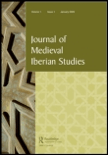
Journal of Medieval Iberian Studies
Unveiling the Secrets of a Pivotal Historical EraThe Journal of Medieval Iberian Studies is a leading academic journal published by Routledge Journals, Taylor & Francis Ltd, dedicated to exploring the diverse and rich tapestry of medieval Iberian history and culture. With its ISSN 1754-6559 and E-ISSN 1754-6567, this journal serves as a vital resource for scholars engaged in the fields of cultural studies and history, attaining a prestigious Q1 ranking in both categories as of 2023. The journal is recognized for its significant contribution to the humanities, featuring peer-reviewed articles that foster innovative research and critical discourse on medieval Iberia from 2010 to 2024. Spanning an array of topics, it encapsulates interdisciplinary approaches to medieval studies, making it an essential publication for researchers, professionals, and students alike who seek to deepen their understanding of this pivotal period in history. Although it currently does not offer open access options, the journal is committed to advancing scholarly discussion and knowledge dissemination within the academic community.